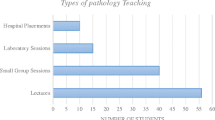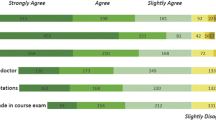Abstract
In line with the UK General Medical Council recommendations, the traditional, taught curriculum at Liverpool was replaced from 1996 by a new one using problem-based learning (PBL) as its principal method of information transfer. There is integration of clinical and preclinical studies, coupled with a reduction in the factual knowledge content and the disappearance of identifiable separate subject courses. Learning is now student-centred. This requires a new approach to the acquisition of pathology knowledge. 1. Pathology is included in all relevant PBL case scenarios by pathology representation on module planning and review committees. 2. Special study modules (SSMs) allow students to observe the practice of pathology including surgical and autopsy work, carry out a detailed study and write a dissertation. Career selectives are provided for individual students in the final year. 3. Clinicopathological (CPC) teaching meetings are held, with the discussion of case examples, clinicians and students contributing. 4. Assessments include the input of appropriate pathology content, integrated with other subjects. 5. A pathology teaching website is provided, containing images, notes, self-assessment questions, handouts, timetables and information. Although the 1996 intake have not yet completed their studies, the results of in-course assessments have been encouraging. The response to the pathology SSMs has been very positive, and the level of presentations and dissertations reached is of a high standard. With the disappearance of a separate subject course in pathology, the subject is being learned by other routes, and the students will complete their undergraduate course with a sound basis for proceeding with their further studies.
Similar content being viewed by others
References
Bligh JA: Problem based, small group learning. BMJ (Editorial) 311:342–343, 1995.
Branda LA: Implementing problem-based learning. J Dental Education 54:548–549, 1990.
Catto G: Specialist registrartraining. (Editorial). BMJ 320:817–818, 2000.
Ferrier BM: Problem-based learning: does it make a difference? J Dental Education 54:550–551, 1990.
General Medical Council. ’Tomorrow’s Doctors’ London, Kiek and Reid, 1993. Also on GMC website: www.gmc.org.uk
Neame R, Murphy B, Stitt F, Rake M: The impact of informatics. Universities without walls: evolving paradigms in medical education. BMJ 319:1296, 1999.
Neufeld VR, Barrows HS: The ‘McMaster philosophy’: an approach to medical education. J Medical Education 49:1040–1050, 1974.
Pallie W, Carr DH: The McMaster medical education philosophy in theory, practice and histprical perspective. Medical Teacher 9:59–71, 1987.
Shaughnessy AF, Slawson DC: Are we providing doctors with the training and tools for lifelong learning? BMJ 319:1280, 1999.
Spencer JA, Jordan RK: Learner centred approaches in medical education. BMJ 318:1280–1283, 1999.
Towle A: Continuing medical education: changes in health care and continuing medical education for the 21st century. BMJ 316:301–304, 1999.
Walton HJ, Matthews MB: Essentials of problem-based learning. Medical Education 23:542–558, 1989.
Woodward CA: The effects of innovations in medical education at McMaster: a report on follow-up studies. Meducs 2:64–68, 1989.
Author information
Authors and Affiliations
Corresponding author
Rights and permissions
About this article
Cite this article
Nash, J.R.G. Pathology in the new medical curriculum: What has replaced the subject courses?. Pathol. Oncol. Res. 6, 149–154 (2000). https://doi.org/10.1007/BF03032367
Received:
Accepted:
Issue Date:
DOI: https://doi.org/10.1007/BF03032367




